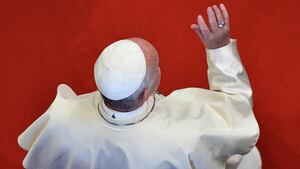ROME—If you look closely at President Joe Biden’s credenza in his first Oval Office photo op, there is a carefully placed shot of the then-vice president shaking hands with Pope Francis after he was inaugurated as pope in 2013. Biden flew to Rome for the papal ceremony—and has regularly quoted the pontiff on the campaign trail, especially on race and economic disparities.
And yet the placement of the photo immediately drew ire among conservative Catholics, many of whom posted on social media that it was “opportunistic” to display a photo with the pope and still support abortion and LGBTQ rights. Many among the most conservative anti-Francis Catholic commentators have gone so far as to say Biden is complicit in the further destruction of the Catholic Church, but the Vatican is not likely to comment on matters seen as political. Those who have long-criticized this pope for opening up a dialogue on both abortion forgiveness and LGBTQ rights are the loudest opponents to the new U.S. president.
As the second Catholic ever to be elected president (after John F. Kennedy in 1960), Biden now has the dubious task of balancing his faith and his politics, which are worlds apart. And he won’t have an easy time convincing any of the U.S. church’s hard-core conservatives that he should be recognized as a member of the Roman Catholic Church. St. Louis, Mississippi, priest Michael O’Connor was quick to remind the conservative faithful that Biden “masquerades as a Catholic” and, as he has said in the past, “Joe Biden is an embarrassment to Catholicism.”
On Inauguration Day, Archbishop Jose Gomez, president of the U.S. Conference of Catholic Bishops, issued a damning statement about the new president, which angered the more liberal factions of the U.S. church and reportedly ruffled feathers in Rome. “Our new president has pledged to pursue certain policies that would advance moral evils and threaten human life and dignity,” he wrote. “Most seriously in the areas of abortion, contraception, marriage, and gender. Of deep concern is the liberty of the church and the freedom of believers to live according to their consciences.”
The statement was immediately rebuked by Francis-loving Catholics, including the influential Cardinal Blase Cupich of Chicago, who tweeted, “Today, the U.S. Conference of Catholic Bishops issued an ill-considered statement on the day of President Biden’s inauguration,” he wrote. “Aside from the fact that there is seemingly no precedent for doing so, the statement, critical of President Biden, came as a surprise to many bishops, who received it just hours before it was released.” In other words, Gomez was not speaking for all the U.S. bishops.
Massimo Faggioli, professor of historical theology at Villanova University and the author of the new book Joe Biden and Catholicism in the United States, told The Daily Beast that on some issues, Biden will have to navigate “a very difficult path between a religious constituency of moderates and a radical-progressive Democratic Party especially on ethical issues: abortion but also LGBT, religious liberty.”
A case in point happened in November 2019 on the campaign trail, when Father Robert Morey, the priest at Saint Anthony Catholic Church in Florence, South Carolina, denied Holy Communion to Biden over his stance on abortion. “Sadly, this past Sunday, I had to refuse Holy Communion to former Vice President Joe Biden,” Morey told the local media. “Holy Communion signifies we are one with God, each other, and the church. Our actions should reflect that. Any public figure who advocates for abortion places himself or herself outside of church teaching.”
Faggioli says Biden’s faith is more about witness than proclamation or proposition. “For Catholics anxious to see immediate results: This takes time to have an impact both on the church and in the public square. In some sense it’s similar to what is happening with Pope Francis’ pontificate,” he says, referring to the struggles this pope has had with hard-core conservatives in the right-wing of the church.
Biden does have a fan in Pope Francis, whose own struggles with conservative Catholics are well-documented. Francis was one of the first world leaders to send Biden congratulations both after his election and after his inauguration, which irked many conservatives who quietly campaigned to keep Trump in office. “At a time when the grave crises facing our human family call for far-sighted and united responses, I pray that your decisions will be guided by a concern for building a society marked by authentic justice and freedom, together with unfailing respect for the rights and dignity of every person, especially the poor, the vulnerable, and those who have no voice,” the pope wrote in his message to Biden on Wednesday.
The same pope once questioned Trump’s Christianity when asked about his desire to build a wall on the U.S. southern border. “A person who thinks only about building walls, wherever they may be, and not of building bridges, is not Christian,” Francis said about Trump in 2017.
But having Francis on his side will not guarantee Biden the support of Catholic Americans. On the contrary, Biden has been the subject of a campaign among conservatives who preferred Trump and who aren’t ready to accept Biden’s compromise Catholicism.
“But there is something new,” Faggioli says. “Biden’s Catholicism represents a new synthesis between the integralist or neo-medieval Catholic model of imposition of values from the top on society—something we can call the Opus Dei model—and the 20th-century assimilationist, often hidden Catholicism—like at the time of JFK and John Kerry.”
In other words, Biden’s brand of Catholicism is more opaque—and closer to Francis. “This is part of the appeal because you may not agree with Joe Biden on all issues,” Faggioli says. “But I sense that many American believers can see something in his faith that is true, that is authentic in him.”





